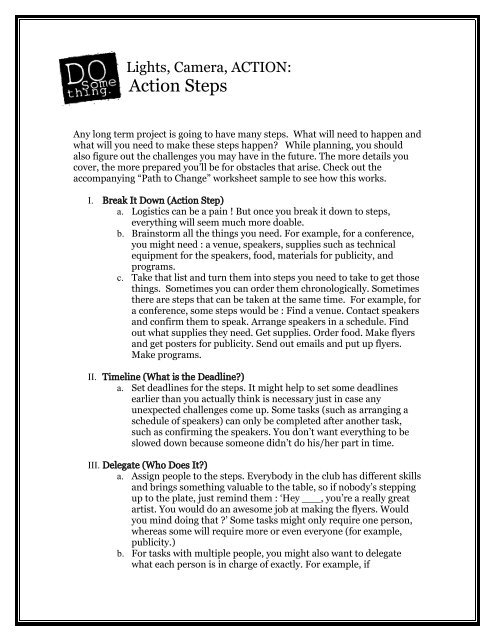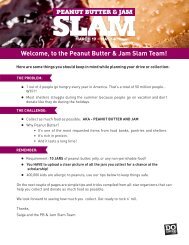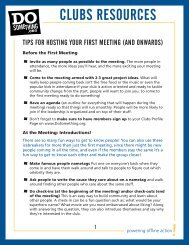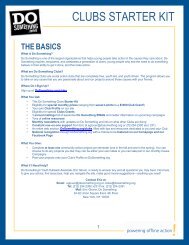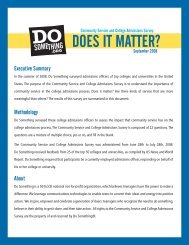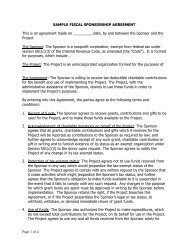PDF/Printable Version - Do Something
PDF/Printable Version - Do Something
PDF/Printable Version - Do Something
Create successful ePaper yourself
Turn your PDF publications into a flip-book with our unique Google optimized e-Paper software.
Lights, Camera, ACTION:Action StepsAny long term project is going to have many steps. What will need to happen andwhat will you need to make these steps happen? While planning, you shouldalso figure out the challenges you may have in the future. The more details youcover, the more prepared you’ll be for obstacles that arise. Check out theaccompanying “Path to Change” worksheet sample to see how this works.I. Break It <strong>Do</strong>wn (Action Step)a. Logistics can be a pain ! But once you break it down to steps,everything will seem much more doable.b. Brainstorm all the things you need. For example, for a conference,you might need : a venue, speakers, supplies such as technicalequipment for the speakers, food, materials for publicity, andprograms.c. Take that list and turn them into steps you need to take to get thosethings. Sometimes you can order them chronologically. Sometimesthere are steps that can be taken at the same time. For example, fora conference, some steps would be : Find a venue. Contact speakersand confirm them to speak. Arrange speakers in a schedule. Findout what supplies they need. Get supplies. Order food. Make flyersand get posters for publicity. Send out emails and put up flyers.Make programs.II. Timeline (What is the Deadline?)a. Set deadlines for the steps. It might help to set some deadlinesearlier than you actually think is necessary just in case anyunexpected challenges come up. Some tasks (such as arranging aschedule of speakers) can only be completed after another task,such as confirming the speakers. You don’t want everything to beslowed down because someone didn’t do his/her part in time.III. Delegate (Who <strong>Do</strong>es It?)a. Assign people to the steps. Everybody in the club has different skillsand brings something valuable to the table, so if nobody’s steppingup to the plate, just remind them : ‘Hey ___, you’re a really greatartist. You would do an awesome job at making the flyers. Wouldyou mind doing that ?’ Some tasks might only require one person,whereas some will require more or even everyone (for example,publicity.)b. For tasks with multiple people, you might also want to delegatewhat each person is in charge of exactly. For example, if
everybody’s working on publicity, then you can assign people todifferent places to put up flyers, different groups to email, etc.c. If it’s a huge project and you have a lot of people in your club, youmight also have committees for different groups of tasks : forexample, publicity, speakers, and food committees.d. Keep in mind that some people are very busy and might need a lotof reminders. Leaders in the club should be responsible for makingsure that everyone’s doing their job. If people have problems withtheir tasks, then the leaders should help them figure out possiblesolutions.e. Remember that you’ll need to delegate tasks for the day of theevent, too. Make sure you have plenty of volunteers to help on theday of the event. You may need people to set and clean up, sell foodor merchandise, or tell attendees where to go. Different eventsrequire different help. If you are holding a car wash you needpeople to wash cars while others direct cars into the place, but aconcert may require an MC and ticket-takers. Make sure you assigneveryone a specific task so your event will be a success.f. Also remember some of the challenges that might come up. Forexample, transportation: you might lack of access to transportationor have a lot of students who can’t drive. <strong>Do</strong>n’t worry—there’s a tonof stuff you can do without driving. You can do lots of projects atschool, such as tutoring, mentoring, education programs, conflictmediation, conferences, and other programs. You can also useschool resources to ask for money for field trips. You might also askparents or seniors in high school to drive. You could also contactlocal organizations like the Kiwanis, Lions Club. Many are retiredand can help.V. Budget (What does it Cost/ How much will it make ?)g. Figure out how much money in general you have to work with.h. Be as specific as possible as to how much money you want to spendon each part of the event. For example, how much for food?printing programs? speakers?i. Also figure out if/how much money you will raise (revenue). Forexample, will you be selling food ? Are you asking for sponsorshipsfrom businesses ? <strong>Do</strong> you have grant money ? Estimate how muchmoney will come from those sources. (see the fundraiser section toofor ideas on how to raise some money at your events).VI. Publicize !a. Personally invite people by email, phone, or in person. Let themknow how much it will mean for you if they participate.b. Have your school newspaper advertise and also cover the actualeventc. Email blurbs out on listservs
d. Send out information on community (church, clubs) newslettersand calendars.e. Design a flyer or poster. Put them up in libraries, communitycenters, stores, and other places that people go in yourneighborhoodf. Reach out to media : local newspapers, radio stations, TV’s. First, ifyou don’t have media contacts, compile a list of contacts (reporterswho cover youth and educational issues might be more receptive).Write down the names, titles, telephone/fax numbers, and emailsof reporters who might cover your events. Call them or email themand introduce yourself. There’s a sample email that you can sendout included in these resources. Keep these contacts with your club!g. If you’re contacting media, you should send them a press release. Apress release should have : your contact information, a headline,and the who/what/where/when/why/how of the event. Fax, email,or mail copies of the release.h. Let a local elected official know about your project !VII. Record your progress !a. Keep all your papers, flyers, and letters, so that you can write asummary at the end of the event.VIII. Reflect on your event :a. What went well? Why?b. What could have gone better ? How could you have improved it?c. Did you achieve your goals? Both in terms of the community andfor yourselves?d. Was everybody involved? How can people get more involved nexttime?e. What are your next steps? How will you reach more people withyour project? What else can you do? (See the Next Steps tipsheetfor some examples..)


